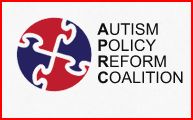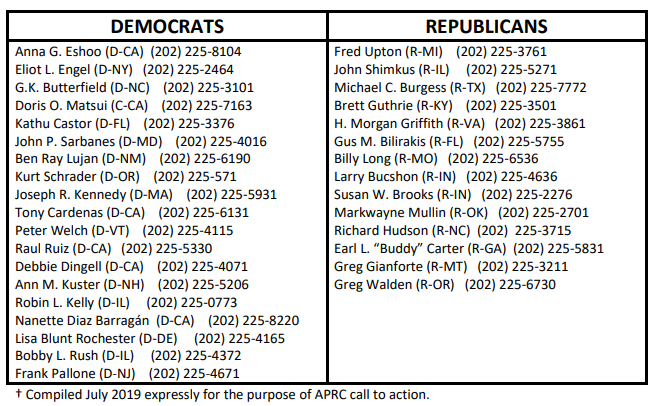July 15, 2019
 Last week we asked you to called the leaders of the Congressional Autism Caucus to add the Autism Policy Reform Coalition (APRC) Amendments (click here for text of Amendment 1 and Amendment 2) to this year’s reauthorization of the Autism CARES Act.
Last week we asked you to called the leaders of the Congressional Autism Caucus to add the Autism Policy Reform Coalition (APRC) Amendments (click here for text of Amendment 1 and Amendment 2) to this year’s reauthorization of the Autism CARES Act.
Thank you for all the calls!
But, unfortunately, the amendments are not yet part of the bill. This week we need to get the House Health Subcommittee to understand how important these amendments are to effective national autism policy.
PLEASE CALL YOUR REPRESENTATIVE AND AS MANY OF THE FOLLOWING SUBCOMMITTEE MEMBERS AS YOU CAN.

USE THE FOLLOWING MESSAGE:
Please include the proposed APRC amendments in the Autism CARES Act reauthorization bill. The current language does not work for us as well as it could. The amendments are important to me because ______________.
IMPORTANT TIPS FOR CALLING:
1. Representatives of BOTH parties need to hear from us! The APRC amendments are non-partisan.
2. A rare few people have time to call all representatives. Please call as many as you can.
3. Do not call representatives in the order listed; select them randomly if you can’t call them all.
4. To better distribute the calls, consider calling Democrats if your representative is a Democrat and Republicans if your representative is a Republican.
5. Do not forget to call your own representative, even if not listed here.
We understand the deep frustration in the autism community, but please be civil with the Congressional staff we are asking for help.
Do not hesitate to call them. They work for YOU!
This alert does not expire until passage of the bill with the amendments.
Image credit: Alpha Stock Images - http://alphastockimages.com/

















Thanks Professor TMR -
Regarding the “Autism Cares” Act. I do remember when the name was changed and I know why it was changed. I guess I’m tired of the neurodiversity control of everything autism - from the public conversation, to autism perception, to policy. Really, there are adults and adolescents with autism who don’t think autism is wonderful (a number of whom have expressed desire for a cure) - and typically their voices are ignored. Voices of parents are almost always ignored…unless of course we think autism is wonderful. I’ve seen parents present at IACC meetings, and committee members are looking at their phones, reading something, talking with the person next to them, even nodding off!
You’re right that the Strategic Plan looks good on paper (looking at the 2016-2017 Plan) - but here are my issues with it.
1) It doesn’t really address severe autism. Yes, severe autism is mentioned and the nod is given that we need more research - but given that a sizeable percentage of the spectrum experiences severe autism, and the impact of severe autism on the individuals and families affected - and the costs to society - this issue doesn’t get the focus it deserves.
2)It doesn’t address self-injury or aggression (both are briefly mentioned as behaviors seen in autism). Yet these behaviors implicate health and safety of the individuals themselves, their families, and communities. I would think identifying why these behaviors happen - and how to ameliorate them - should be a major research focus. I think this is at least as important as researching gastrointestinal issues (although I am glad that GI issues are finally getting some of the attention they deserve).
3) It doesn’t recommend research on autistic regression. It would be interesting to learn what percentage of individuals show symptoms of autism from birth and what percentage regress into autism. And of those who regress, what are the triggers? I don’t understand why no one is interested in looking at that. I know my son wasn’t the only kid who was bright, sociable, very verbal, and enthusiastic until age 2.
4) It ignores the elephant in the room - vaccination. PACE Law Review did an analysis of “vaccine court” awards and found dozens of cases where the court had awarded damages for vaccine-caused autism. Not saying every case of autism is caused by vaccination, but given the experience of tens of thousands of parents, it’s more than anecdotal. Certainly worth researching.
5) It ignores the profound intellectual disability and the difficulties with communication (even with the best augmented communication methods we currently have) that affect a sizeable percentage of individuals with autism. It does say that this is an understudied population, but once again, that doesn’t really demonstrate how large the population is, or how devastating the impairments are.
6) Most of all - I don’t see any urgency in this plan (which may be why HHS ignores it). The research projects proposed could easily take several decades to fully explore - likely more. In the meantime, the recovery rate will likely continue to hover around 8%, and the number of children and adults with autism will continue to grow. Really, how bad do the numbers have to get before action will be taken?
This is why I think it would take more than a few small tweaks to make the IACC more effective. Given the amount of money spent on the IACC in the last two decades - over $20 million dollars without one new, effective treatment or therapy, it may be time to scrap the committee and start over from scratch. And of course, increased clout would be one of the things to include.
But I’d value your thoughts with respect to my comments. Maybe I’m missing something.
I agree with ALL your criticisms, as does the Autism Policy Reform Coalition. Our policy proposals are FAR more extensive than these two amendments. And last time around we sought to kill the bill altogether if they did not consider major reform. Despite being whole-heartedly endorsed by Autism Speaks and their millions spent on lobbying, we did manage to stop it for several months, but it eventually went forward unchanged.
Since then, we have gained a bit more influence in Congress and were able to get specific language about exploration of environmental causes, particularly of REGRESSIVE autism, put into the appropriations bill for two years. And last year we had a completely new bill drafted, but the bizarre political climate kept legislators from risking their careers by sponsoring it.
However, it is important to do what we CAN do to effect change. And providing some recognition of the ineffectiveness of the IACC so far, particularly with respect to those people who experience multiple co-occuring medical conditions, is important.
Some of your points are meant to be addressed by the second amendment we proposed, requiring the development of a “best practices” medical approach to autism. That would entail a greater engagement with “severe autism” as those individuals find themselves in emergency rooms on a more frequent basis than do those whose disability is less severe. In addition, one of the most frequent concerns is the aggression and self-injury that you mentioned in point 2, particularly in non-verbal teens and adults. The majority of the time, these kids are treated inappropriately with psych meds rather than treatment aimed at rooting out the physical causes for their aggressive behavior.
The lack of urgency you detect in the plan isn’t the reason HHS ignores it. HHS ignores it because they can. When IACC has expressed urgency, HHS has ignored it just as much as when they haven’t.
I’m not impressed with the IACC - it’s been in existence for almost 20 years- is not interested in finding a cure - and has not come up with ONE effective treatment or therapy during that time. Meanwhile, it costs $1.38 million dollars a year to operate (according to SafeMinds). The autism rate has risen from 1 in 150 to 1 in 59 (higher in some states). The public representatives on the IACC are all anti-cure neurodiversity advocates.
Not clear how these amendments will help this situation. Also, why isn’t anyone trying to change the ridiculous name of the law - Autism Cares? Really?
Despite the bias inherent in many IACC members, they have managed to come up with strategic plans that are actually not bad. However, they have absolutely zero authority to enforce them. Health and Human Services as well as the National Institutes of Health have been free to completely ignore their suggestions, some of which have actually been quite good (Lyn Redwood shared letters regarding approaches to mitigate the impact of wandering that were completely ignored by the Secretary of Health and Human Services).
Is IACC perfect? Not by a long shot! Could it be far more effective than it is with a few small tweaks? Yes, indeed.
Of course, there will always be people who will try to undermine effective action, but that doesn’t mean it isn’t worth. The APRC position paper is far more encompassing, but there is virtually no one in Congress who is willing to back ideas that would create major systemic change at the moment. We had a Congressman ready to introduce our dream bill last year, but he couldn’t get a co-sponsor from across the aisle, and THAT is disheartening.
It used to be the Combating Autism Act and the neurodiverse community lobbied hard to change that, arguing that “combating autism” equated to “combating people with autism.” It doesn’t, of course, but it is understandable why it would feel that way.